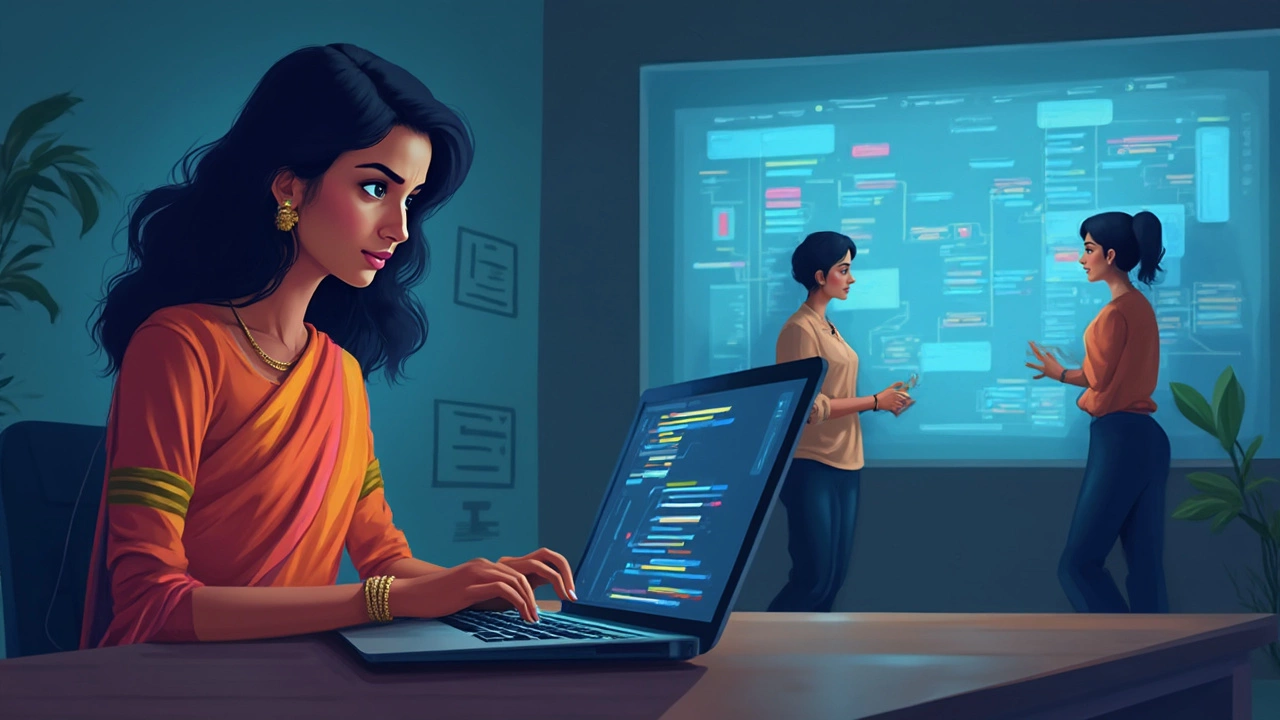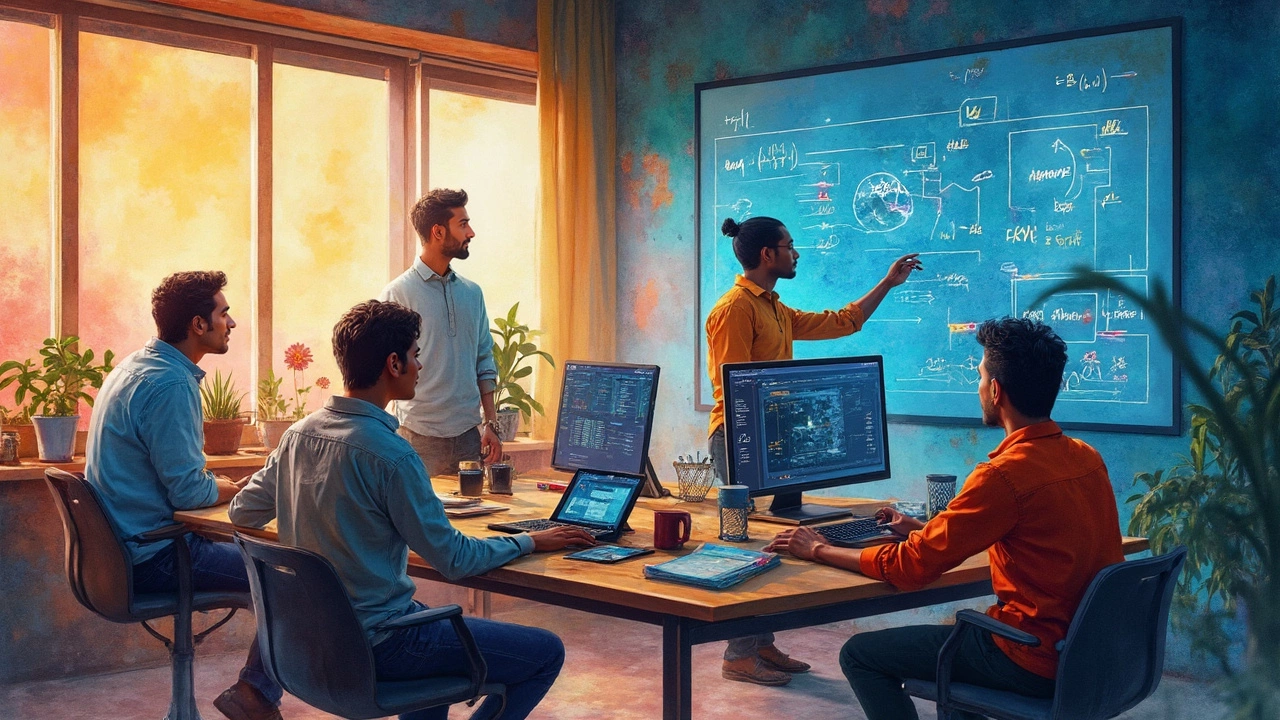Understanding the Difference Between Coding and Programming
 Feb, 20 2025
Feb, 20 2025
Ever wondered if coding and programming are just two ways of saying the same thing? You're not alone! In the tech world, they're often tossed around like synonyms, but there's more to them than meets the eye. Let's break it down.
Think of coding as writing a recipe. You've got to use the right ingredients (that's your syntax) to get the dish (your program) just right. Coding is all about translating human instructions into a language a machine understands. It's detailed, requires precision, and is language-specific like Python or JavaScript.
But programming? That's like planning the whole dinner party! It's about understanding the big picture—what you want to achieve. Programming includes not only writing code but also designing algorithms, debugging, and optimizing to solve problems efficiently. It involves creativity and logic to map out the whole software creation process.
- Defining Coding
- Understanding Programming
- Key Differences
- Common Misconceptions
- Real-World Applications
- Tips for Beginners
Defining Coding
In the world of tech, coding is like learning a new language—literally. When you code, you're writing instructions in a language that computers can understand. These languages come with their own unique syntax, and just like grammar in spoken languages, following these rules is crucial. Whether it's Python, Java, HTML, or CSS, each coding language has its own style and purpose.
Now, what exactly happens when you code? At its core, coding involves converting logic into something a computer can do. For instance, if we compare a computer to an incredibly fast chef, then coding is giving that chef a step-by-step recipe to follow. Miss a step or use a wrong ingredient (a.k.a. an error in syntax), and you'll end up with a dish quite different from what you intended!
Breaking It Down: Why Coding Matters
Coding is the first step in bringing any application to life—from simple smartphone games to complex banking systems. Want to display an image on a webpage? That's coding. Need to access data from a database? Yep, coding again. The ability to code gives us the power to create and innovate with technology.
Here's an eye-opener: According to a 2023 report from Stack Overflow, there are over 700 coding languages available. But don't panic! Most coding job demands focus on a handful of popular ones like JavaScript, Python, and Java.
Getting Started with Coding
If you're a newbie, starting can feel overwhelming. But here are some steps to kick-start your coding journey:
- Choose a beginner-friendly language like Python.
- Use online platforms like Codecademy or freeCodeCamp to practice.
- Join a community—there are tons of forums and groups ready to help.
Grasping the concept of coding is about practice and persistence. Once you get the hang of it, you'll have the foundational skills to explore more complex areas of programming.
Understanding Programming
Let's dive into what makes programming more than just a buzzword. Programming is about creating a comprehensive set of instructions for a computer to follow. Think of it like composing a symphony where the code represents musical notes, and the program itself is the final masterpiece.
It's All About Logic and Design
A big chunk of programming focuses on algorithm design. Algorithms are like the blueprints for problem-solving. They help break down complex tasks into manageable steps, ensuring that the solution is efficient and effective. Programs are crafted by identifying what needs to be accomplished and strategizing the best approach to reach the goal. This process often involves using flowcharts or pseudocode to illustrate the flow of data and logic.
Beyond Coding: The Bigger Picture
While coding is a significant part of programming, there's much more like debugging, testing, and iteration. Bugs are like tiny gremlins that sneak into your code, causing mischief. Debugging involves spotting these errors and fixing them to ensure the program runs smoothly. It's not just about getting things to run but making sure they run well!
Stats and Facts
In 2023, about 60% of developers reported that their primary role involved aspects beyond coding alone, like software analysis and architecture planning. A successful programmer is often well-versed not just in writing code, but also in understanding the broader context of how that code fits into a system or a business process.
The role of a programmer extends to maintaining and updating existing codebases, ensuring that as requirements change, the program still meets user needs without introducing new errors.
From Idea to Execution
Every program starts as an idea. This idea gets fleshed out into a plan with specific outcomes. Then comes the execution phase, where coding happens, and voila! The program comes to life. But guess what? The journey doesn't end there. Programs evolve through updates and new features based on user feedback and technological advances.
Understanding programming means appreciating it as a continuous cycle of improvement and innovation. It's not just about creating something that works but crafting solutions that stand the test of time—robust and scalable.
Key Differences
Let's nail down what sets coding and programming apart. Spoiler: it's more than just the lingo techies use! Although they work hand in hand, they're far from identical.
Scope of Work
Coding is all about writing the lines of code. It's the nitty-gritty of instructing computers using languages like Python, C++, or Java. If coding were a building block, it would be the bricks used to construct a house.
On the flip side, programming involves planning and executing a whole project. It's a bigger picture, more comprehensive process. You're creating, testing, and maintaining entire systems. Imagine it like being the architect who designs how the house should look and function.
Problem-Solving vs. Syntax
Programming is where you tackle complex problems. It's about designing algorithms and finding solutions. Coders, however, spend their time on syntax and ensuring everything functions without errors.
Tools and Techniques
For coding, familiarity with text editors (like Visual Studio Code or Sublime Text) and compilers is crucial. Meanwhile, programming calls for version control tools, integrated development environments (IDEs), and sometimes even a touch of math or logic skills.
Here's a quick peek at how these aspects might align:
| Aspect | Coding | Programming |
|---|---|---|
| Focus | Writing Code | Solving Problems |
| Tools | Text Editors | IDEs, Version Control |
| Objective | Execute code snippets | Create full-fledged applications |
Understanding these differences doesn't just flex your knowledge muscles, it also helps nurture the right skills to make a mark in the techspace!

Common Misconceptions
It's easy to get twisted up about what coding and programming really mean, especially since they often get thrown into the same mixing pot. Let's clear the air by debunking some of the biggest myths out there.
Myth 1: Coding is the Same as Programming
It's a classic mix-up! Coding is about translating instructions into a language a computer can understand, while programming is a broader term that covers everything from determining objectives to designing and testing complete software solutions. So, they're related, but definitely not identical twins.
Myth 2: Coding is All You Need to Know
Some think they can just dive into coding classes and come out as full-fledged developers. But here's the reality: while coding is a crucial skill, programming involves a lot more, like problem-solving, system architecture, and project management. Those extra skills are key to moving from writing lines of code to crafting functioning, complete applications.
Myth 3: Programmers Don't Need to Write Code
It's like saying a chef doesn't need to cook! While high-level programming might involve planning and design, sooner or later, you're going to need coding chops to bring your ideas to life. The two go hand in hand, no matter how high you climb in software development.
Why These Misconceptions Matter
Getting these concepts straight is more than just trivia—it's about setting the right expectations. Whether you're just starting out or looking to refine your skills, knowing the difference can help you choose the right path, the right courses, and ultimately, the right job. Mixing up coding and programming can lead you down a rabbit hole of confusion and frustration. Better to know what you're diving into, right?
Real-World Applications
So, how does all this talk about coding and programming play out in real life? You'd be surprised where these skills show up! Let's dive into some cool applications.
Coding in Everyday Tech
Ever watch a movie on Netflix or scroll through Instagram? Yep, coding powers these apps! It's the backbone of the software that runs on our devices, making entertainment and social interaction smooth and engaging. Coders write the scripts that define what happens when you click, swipe, or tap.
Programming in Complex Systems
Programming, on the other hand, is often at the heart of more complex systems. It's what makes your GPS work so accurately, or how Amazon knows exactly what you might want to buy next. Behind these systems are programmers designing, testing, and refining algorithms to enhance user experience and efficiency.
Industries Relying on Coding and Programming
From finance to healthcare, nearly every industry benefits from technology boosted by coding and programming. For instance, in healthcare, programming helps develop software that doctors use for diagnosing patients. Banks use it for secure online transactions, maintaining your financial information safe and sound.
Fun Fact
Here's a nugget to chew on: According to an analysis of labor market data, jobs requiring coding skills are projected to grow about 12% faster than other occupations. So, if you're thinking about diving into coding classes, you're onto something with loads of potential.
From the apps that run on your phone to the systems managing city traffic, coding and programming are everywhere, shaping our present and future in fascinating ways. Whether you're looking to solve real-life problems or just want to create the next viral game, knowing the difference between these two can start you on the right path.
Tips for Beginners
So, you're ready to dip your toes into the world of coding and programming? That's awesome! Here's how to get started without feeling overwhelmed.
Start with the Basics
Don't rush. Pick a simple programming language like Python to begin your journey. It's beginner-friendly and widely used in the industry. You'll get a taste of both coding and programming concepts.
Practice Regularly
Practice makes perfect. Set aside some time every day to write code. Even if it's just an hour, consistency is key. This helps reinforce what you've learned and builds confidence.
Work on Real Projects
There's no substitution for hands-on experience. Start with small projects like building a basic web page or a simple calculator. It’s an excellent way to apply your newfound skills and learn problem-solving.
Learn from the Community
The tech community is super supportive. Join forums, attend meetups, or participate in online communities. Sites like Stack Overflow are gold mines for seeking and sharing knowledge.
Stay Curious and Keep Learning
The tech world is ever-evolving. Technologies change, trends shift. Make it a habit to read blogs, watch tutorials, and stay updated with new tools and practices.
Focus on Problem-Solving Skills
While coding forms the backbone, sharpening your problem-solving skills will make the programming process smoother and more efficient.
Don’t Fear Errors
Mistakes are part of the journey. Debugging helps you learn more efficiently. Each error is just another opportunity to improve.
Here's a quick snapshot of popular languages and their uses:
| Language | Primary Use |
|---|---|
| Python | Web Development, Data Science |
| JavaScript | Web Development |
| Java | Mobile Apps, Enterprise Solutions |
| C# | Game Development, Windows Applications |
Remember, the journey into coding and programming is personal, so go at your own pace. Celebrate the small victories, and before you know it, you’ll be navigating through the coding world like a pro!